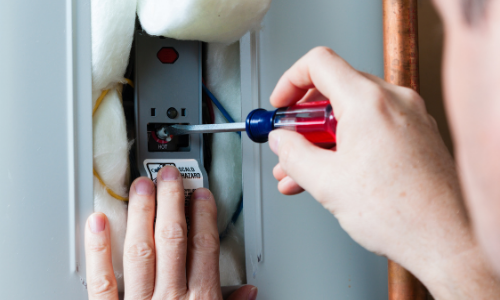Dealing with the Typical Water Heater Crisis Scenarios
Dealing with the Typical Water Heater Crisis Scenarios
Blog Article
We've come across this post pertaining to The Importance of Water Heater Maintenance directly below on the web and think it made good sense to relate it with you in this article.

A water heater is just one of the most important standard devices that can be found in a residence. With hot water heater, you don't need to undergo the stress and anxiety of home heating water by hand each time there is a requirement to take a bath, do the laundry, or the dishes. Nevertheless, there is always a possibility that your water heater would act up as with the majority of mechanical devices.
It is very important to note any little malfunction and tackle it quickly before things get out of hand. Many times, your water heater begins to malfunction when there is a build-up of sediments as a result of continual use. As a safety measure, routine flushing of your hot water heater is recommended to prevent debris buildup and also stop useful failing.
Usual hot water heater emergencies and exactly how to take care of them
Dripping hot water heater container.
In this scenario, you should transform off your water heating system, enable it to cool down, and also carefully look for the source of the problem. At times, all you need to do is to tighten a couple of screws or pipe connections in situations of small leaks. If this does not function as well as the leak persists, you may require to employ the solutions of a service technician for a proper substitute.
Rising and fall water temperature.
Your water heating unit might begin creating water of different temperature levels usually ice scalding or chilly hot. There might be a need to replace either the home heating or the thermostat system of your water heating unit.
Insufficient hot water
It might be that the water heating unit can't sustain the warm water demand for your house. You could update your water heater to one with a larger capability.
Blemished or stinky water
When this happens, you require to recognize if the problem is from the storage tank or the water resource. If there is no amusing odor when you run chilly water, after that you are particular that it is your water heater that is faulty. The stinky water can be triggered by rust or the build-up of microorganisms or sediments in the water heater container.
Final thought
Some home owners overlook little caution and also minor faults in their hot water heater device. This just results in additional damage and a possible total failure of your appliance. You must handle your hot water heater mistakes as soon as they come up to stay clear of more costs as well as unneeded emergency problems.
With water heating units, you don't need to go via the stress of home heating water by hand every time there is a demand to take a bath, do the washing, or the dishes. Your water heating unit can begin generating water of various temperature levels normally ice chilly or scalding hot. It may be that the water heater can't sustain the warm water demand for your house. If there is no amusing smell when you run chilly water, after that you are particular that it is your water heater that is malfunctioning. The odiferous water can be triggered by corrosion or the accumulation of bacteria or sediments in the water heating unit container.
Common Water Heater Issues and What You Should Do
What Type of Water Heater Do You Have?
Before we begin it’s first important that you identify the type of water heater you have on your property. There are two main types of water heaters out there: conventional and high efficiency.
Both of these types of products typically use either gas or electricity to heat power. There are also solar water heaters that use a thermal collector on the roof or yard to heat the water.
While these models are not as common, they can cut heating costs in half. In this article, we will focus on conventional and high efficiency.
How Do My Electric and Gas Water Heater Work?
Though they look similar, electric and gas water heaters work very differently. It’s important to know their basic function because often problems can be specific to the heating source.
In the electric model, a thermostat on the side of the machine detects the temperature of the water in the tank. When the temperature needs to rise electricity flows to a heating element suspended in the water.
Gas models also use a thermostat device — typically with a mercury sensor at the tip and an additional sensor called a thermocouple. The thermocouple detects whether the pilot light is on and controls the flow of gas.
When the thermostat drops below the appropriate level gas is released which becomes ignited by the pilot light. The flame heats the bottom of the water tank which causes hot water to rise and cold water to drop.
This natural circulation continues until the water reaches the desired temperature. Then, the thermostat triggers the gas control valve to shut off the flow of gas.
What Are the Most Common Issues and How Do You Fix Them?
https://happyhiller.com/blog/common-water-heater-issues-and-what-you-should-do/

I stumbled upon that entry about Is Your Water Heater Leaking? while doing a lookup on the search engines. Do you know about somebody else who is in the market for the niche? Take a moment to share it. Many thanks for your time. Don't hesitate to check up our site back soon.
Ready to assist, call now! Report this page